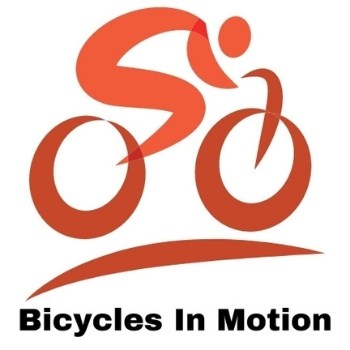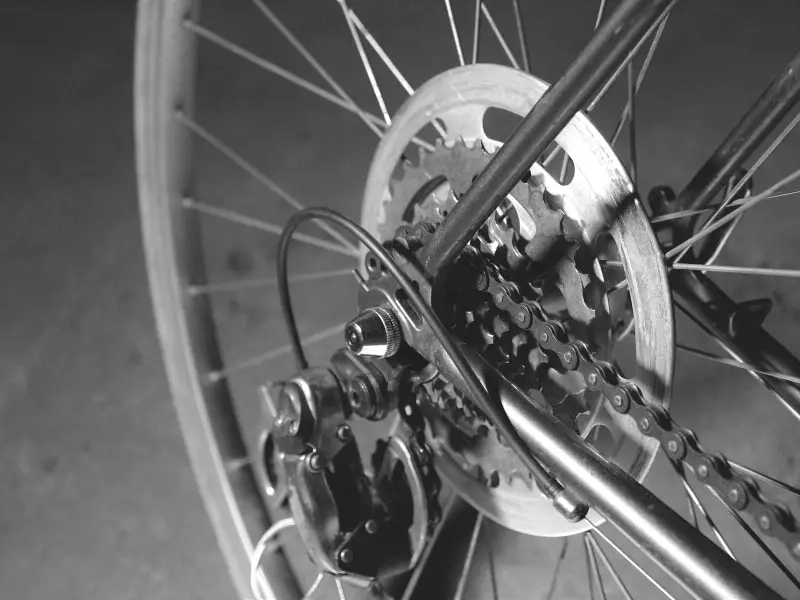Do you need a spoke protector on your bike? Some people say they are necessary while others will say they’re not.
A spoke protector is not needed in order for your bike to function properly. However, spoke protectors can help avoid unnecessary bike repairs due to the chain getting lodged in between the cassette and spokes and damaging them. It acts as a shield to protect your spokes.
In this article, I’m going to discuss if you need a spoke protector on your bike and the benefits of having one. We’ll also talk about why some people remove their spokes protectors from their bikes!
Recommended Gear
To see all of my up-to-date recommendations for bikes and cycling gear, check out this resource that I made for you!
Table of Contents
What Is A Spoke Protector or Dork Disc
A spoke protector is also called a dork disc because if the rear derailleur is adjusted correctly, the disc is unnecessary.
A spoke protector is a plastic disc that goes in between the cassette and spokes on your rear tire in order to protect your chain from going into the spokes.
It acts as a barrier to protect your spokes in case the chain slips off the cassette. This will cause your inner spokes to get bent, damaged and sometimes broken if you don’t have a spoke protector in place!
What Does A Spoke Protector Do
A spoke protector is insurance for your spokes if the chain happens to come off the cog and lodges in between freewheel or cassette and the spokes.
If this happens, the spokes will get chewed up and could break if you don’t have a spoke protector on.
Just 1 time of your chain getting lodged in there, and depending on how fast you are pedaling, could significantly damage the spokes.
If this happens, you could end up having to get a whole new wheel. This could save you a lot of time and money when it comes to having to replace your wheel if this does happen.
There are many reasons why the chain can come off the cassette including a broken or jammed derailleur, bent pivots, damaged wheel axle, rocks or debris, doing jumps or ramps, improper shifting while going through rough terrain.
Is A Spoke Protector Necessary
A spoke protector is not necessary for the bike to function and there is no guarantee that it will protect your spokes if your chain or derailleur fail.
Since it is made of plastic, if the bike is hit by rocks or debris, the spoke protector could break. Also, over time, the plastic could become brittle and start to break due to the weather.
The main reason to use a spoke protector is for a little extra peace of mind it can offer.
If you put even minimal value on your bike and want to prevent expensive repairs, then I recommend that you keep the spoke protector on.
Can You Remove Dork Disc From Bike
The dork disc can be removed from your bike and is pretty simple. First, feel the disc with your hands to see if it is still firm or if it is worn.
If the plastic disc is brittle, the easiest way to remove is by using a screwdriver and break the disc into pieces.
Once you have broken off enough pieces, pull the disc out from the cassette. Most of the times the disc is just placed in between the cassette and the wheel with noting tightening it down.
If you do have a couple screws holding it in place, remove the screws and the disc should pop off.
If the disc is still firm and not easily breakable by your hand or screwdriver, you will need 3 tools to help you remove it.
A chainwhip, a cassette remover & a wrench is needed to remove the bolt that holds the cassette in place and then you can easily take off protector.
If you don’t have any of these, I would suggest taking your bike to a local shop to have them remove.
Who Should Get A Spoke Protector And Who Shouldn’t
A spoke protector is good if you are a beginner cyclist, someone who rides off road a lot, someone who is not familiar with gear shifting or someone who likes to go off ramps and jumps.
A beginner usually has a cheaper bike with cheaper parts, so if something was to go wrong, it wouldn’t cost a fortune to fix.
Usually, cheaper bikes are not well taken care of like the more expensive bikes.
People who have bikes used for recreational purposes usually don’t know all of the ins and outs of bicycles. Having the spoke protector on is a good idea for extra security.
If you have gears on your bike, shifting incorrectly could cause the chain to slip. You want to make sure that your bike is in the right gear before jumping off a ramp or any other obstacle.
For someone who does not know how to use gears, it would be best for them to have on spoke protector, so they don’t risk causing any damage to their bike.
If you like to take your bike off road, there are a lot of rocks, debris, twigs and potholes that could cause serious damage.
I would recommend leaving the spoke protector on because the chances are greater that a wipe out could occur or running over something that springs up into your wheel and cause damage.
Same goes if you like to go off ramps and jumps. I would recommend leaving the spoke protector on.
When you land, it could cause your bike chain to slip out of place and get caught next to your spokes, causing damage.
If you are an experienced rider or someone who regularly cleans and maintains their bike, you can remove the spoke protector if you would like.
Usually, an experienced rider has knowledge of shifting gears, they know the ins and outs of their bike, so they have a little less risk of an issue compared to someone else.
Keeping your bike maintained is a big key to this. Making sure the bike chain is lubed and tight, making sure all of the bolts are secure, and all of the parts are replaced if worn, all contribute to having less risk of an accident.
After speaking with a buddy of mine who runs a local bicycle shop in town, I asked him what percentage of people have their spoke protector on whenever they bring their bike in for a tune up and he said that most of the average cyclists and beginners, have the disc on when they bring their bike in.
For more experienced riders, most of them took them off. There were only a few that had them on because they had an unfortunate situation in the past where if they would’ve had the protector on, it could’ve saved them from doing the damage it did.
Benefits Of Having A Spoke Protector On Your Bike
There are many benefits to having a spoke protector on your bike. Some of these benefits are:
- Protects your spokes from getting damaged in case the chain slips off the cassette.
- Prevents your chainset, wheel and frame from being scratched or scraped by the cassette when it shifts on rough terrain.
- Keeps dirt off spokes
- Acts as a barrier between spokes and chain in case of accident
- Protects from debris knocking the chain into the spokes
- Keeps brake pads from getting dirty and squeaking
Disadvantages of Having A Spoke Protector On Your Bike
There are some disadvantages to having a spoke protector on your bike. Some of these include:
- Over time they can get brittle and fall apart, and pieces can fall into gears causing you not to be able to pedal
- More weight. Even though they are plastic and don’t weigh that much, some cyclists want to strip their bike of every unnecessary thing they can cause extra weight.
- If the spoke protector is old and warped, it can rattle when you ride causing an annoying sound.
- Some people think they look ugly and make you look amateurish
- There is no guarantee that the plastic spoke protector will save the spokes if the chain drops. Depending on the situation that caused the chain to drop, like jumps or debris, it would cause damage either way
- Twigs & branches will still cause issues with spokes
- Dirt can get caught in between the spoke protector and the cassette and cause buildup.
Final Thoughts
If you’re a beginner rider, having a spoke protector is a good idea. You won’t have to worry about damaging your bike’s spokes from the chain slipping.
However, if you have been riding for some time and you regularly clean and maintain your bicycle, then a spoke protector probably won’t be necessary.

